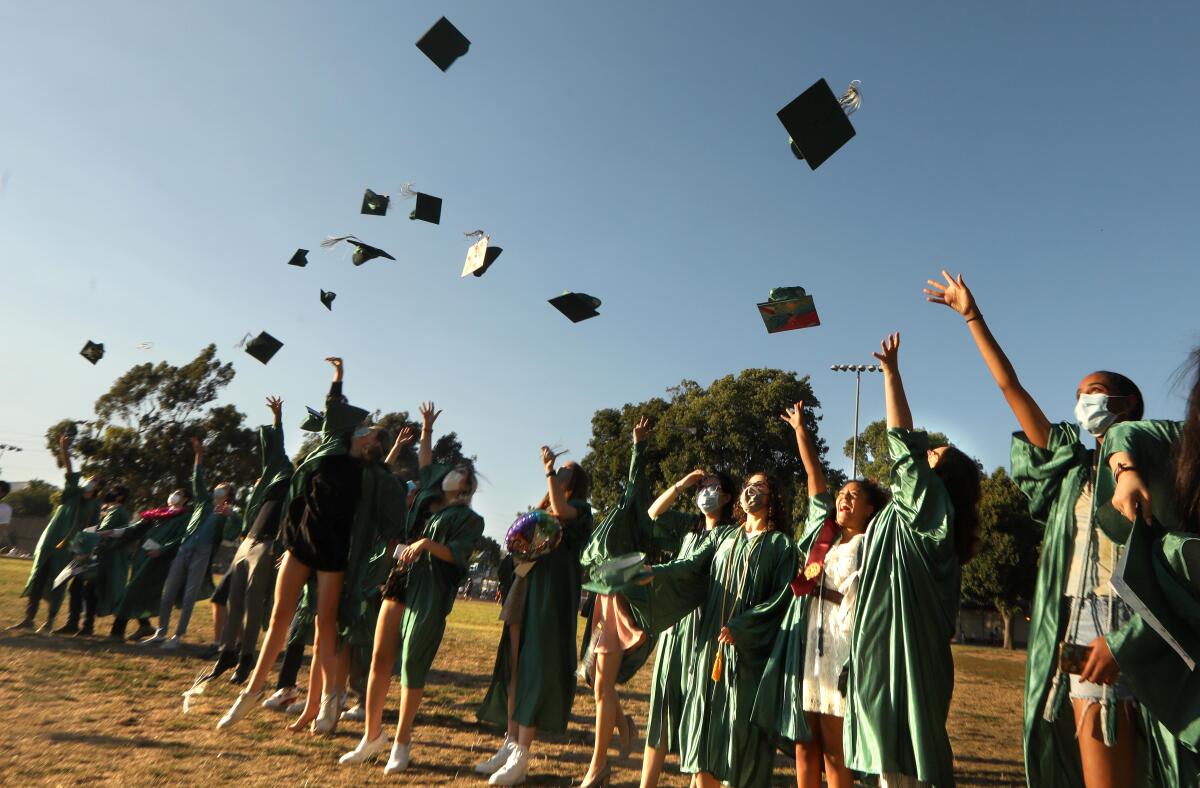Proposition 18 would allow some 17-year-old Californians to vote

- Share via
SACRAMENTO — Voting for the first time may soon join graduating and dancing the night away at the spring prom as a milestone event for thousands of 17-year-old high school seniors in California.
If approved by California voters, Proposition 18 would allow 17-year-olds to vote in primary and special elections if they turn 18 before the next general election.
Should the proposed amendment to the state Constitution be approved, California would join at least 18 other states — red and blue alike — that allow some 17-year-olds to cast ballots. Under current California law, residents must be 18 years old to vote in any election.
“They’re sitting in a high-school classroom, so there’s an opportunity there for these kids to learn about the mechanics of voting, to learn about the importance of elections in general and the importance of democracy,” said Assemblyman Kevin Mullin (D-South San Francisco), one of the authors of the proposed constitutional amendment. “It’s a modest move to expand voting rights for young people.”
The Democrat-controlled Legislature voted in June to place Proposition 18 on the ballot, roughly 16 years after Mullin’s father, former South San Francisco Assemblyman Gene Mullin, first introduced it. Both men introduced the measure several times, only to fall short.
Proposition 18 lacks the political buzz and heaps of campaign cash enjoyed by several of the most hotly contested ballot measures this election, making it hard to gauge whether it will win over voters.
The proposition has been endorsed by the California Democratic Party and several of its top elected officials, including Gov. Gavin Newsom, Lt. Gov. Eleni Kounalakis and Secretary of State Alex Padilla.
Proposition 18 is opposed by the California Republican Party, which argues that 17-year-olds should not be able to vote on proposed tax increases. Jon Coupal of the Howard Jarvis Taxpayers Assn. said even more seasoned California voters have difficultly understanding the potential taxpayer costs of bonds and the complexities of ballot measures, something he said is likely to puzzle 17-year-olds even more.
“I do think it is a maturity question,” Coupal said.
Republican Sen. Andreas Borgeas of Modesto said California also has become more cautious when it comes to determining the age of maturity. The state recently changed the law to require Californians to be 21 years old before they can buy tobacco products, the same age restriction as purchasing alcohol.
“You don’t get to drink six months, or a few months before you hit 21 because you’re that close,” Borgeas said when the measure was debated in the state Senate in June.
Ella Yitzhaki, 18, dismisses that argument. Yitzhaki, a graduate of Lowell High in San Francisco who is currently a freshman at Cornell University in New York, said recent studies show that many young voters are registering as independents, or “no party preference,” in California.
“If you just look at where this has passed already, the 18 states that have passed it, you will see that there is no partisan trend to it,” said Yitzhaki, who testified before the Legislature in favor of the constitutional amendment. “ If an idea like this could pass in Hawaii and Kentucky, then I don’t think that there’s any sort of partisan angle to this. This is literally about giving people the full right to vote. That’s it.”
Under current law, 16-year-old and 17-year-old citizens are already eligible for voter “pre-registration” in California, a designation that makes them automatically registered to vote when they turn 18. The intent of the law was to encourage more engagement and participation in the political process. There are currently 125,548 teenagers pre-registered to vote in California.
In testimony before state lawmakers, Mindy Romero of USC’s Center for Inclusive Democracy said that voters who engage with the political process at a young age tend to stay involved and continue to vote later in life. Allowing a 17-year-old to cast a ballot in a primary election will probably increase the odds that they will vote again in the general election when they are 18 years old, she said.
“I think there’s a real possibility here not only in terms of increasing potential participation and voter turnout levels but also just making the voting process more salient,” said Romero, who did not take a position on the proposed measure. “Voting is habit-forming. We want to make that a solid relevant process for young people as early as possible.”
More to Read
Sign up for Essential California
The most important California stories and recommendations in your inbox every morning.
You may occasionally receive promotional content from the Los Angeles Times.











